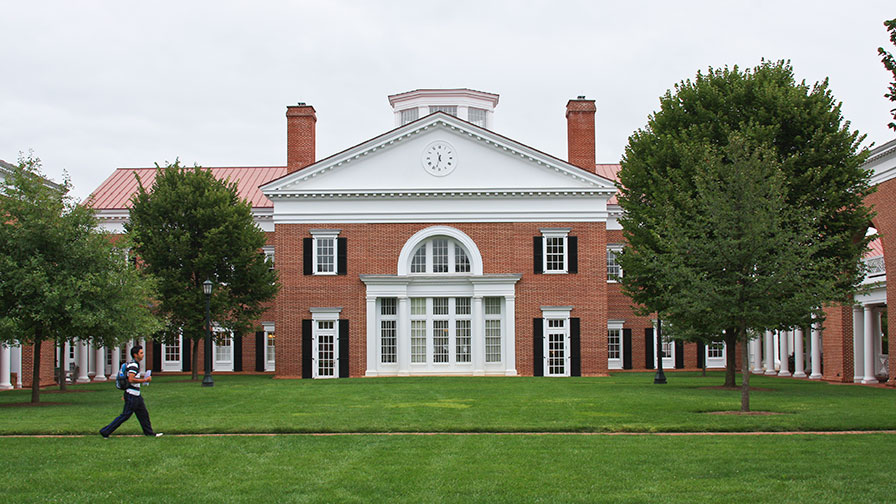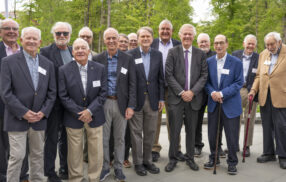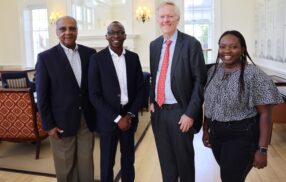
The Coffee Shop Effect
Walk into any coffee shop, and you’ll see people who are there not to socialize or relax or even drink coffee, necessarily, but to work. They’re the ones typing intently on laptops or scribbling in notebooks, surrounded by other people but deeply engaged with their task.
This might seem counterintuitive. Why would anyone needing to get work done seek out an environment filled with potential distractions? Because, as Eileen Chou has found, just being around other people makes us better at certain kinds of creative tasks.
“We are social animals,” says Chou, an assistant professor at The University of Virginia’s Frank Batten School of Leadership and Public Policy. In a project supported by the Darden School’s Batten Institute, Chou, Loran Nordgren of Northwestern University’s Kellogg School, and U.Va. student Marshall Hanbury, Jr., are researching how the presence of other people affects individuals’ creative abilities and how subtle changes in workplace environments might boost innovation.
Before turning to the issue of creativity, Chou and Nordgren studied whether being in the presence of other people would influence risk-taking behaviors. In a series of experiments, they found that people who were in a room with other people, all of whom were engaged in independent tasks, were more likely to tolerate financial volatility and make risky financial gambles than people who were alone. Merely being physically present with other people-not interacting with them in any way-gave study participants a sense of security, the researchers found. It could be that even if people aren’t directly communicating they are sending subtle cues to one another, Chou notes. But this “mere presence effect” was evident only when participants were around people who seemed to share their social identity or belong to the same broad group.
Conducting similar experiments with a focus on creativity has been a logical move. “Creativity and innovation require some risk taking and uncertainty,” Chou notes, “and people need a way to deal with that.” In one recent experiment, Chou and her collaborators asked participants-randomly assigned either to a room with two other people or to a room alone-to solve what’s known as Duncker’s candle problem, in which participants are given a book of matches, a candle, and a box of tacks and are asked to find a way to attach the candle to the wall in such a way that wax won’t drip onto the floor. In another experiment, participants were given three words and asked to supply the fourth in the series. In both experiments, participants who were in the presence of others were more likely to solve the problems than those who were alone. Perhaps ironically, the sense of security we gain from being around others may push us out of our comfort zones, enabling us to take certain kinds of cognitive risks.
Does this research suggest that we can’t be innovative or creative if we’re alone? No, Chou says. What’s important, she notes, is the kind of task her study participants were performing. Both tasks, she said, depended on “convergent thinking”: the ability to come up with the correct answer to a complex problem. Participants who were in a room with others were more likely to realize that they could solve the candle problem by emptying the box of tacks, putting the lit candle in it, and then tacking the box to the wall. They were also more likely to come up with the one word that correctly completed the series. Both tasks required a creative approach to problem solving, but they did not depend on “divergent thinking”: the ability to explore many possible solutions to a problem and to see connections between seemingly unrelated ideas.
“Our research suggests that we are best with convergent creativity when we are around other people, but it could be that divergent creativity requires seclusion,” she says. As Yahoo CEO Marissa Meyer said in conjunction with her 2013 announcement that the company’s employees would no longer be allowed to work from home, “While people are more productive when they’re alone,…they’re more collaborative and innovative when they’re together.”
Chou’s work, which draws on social and cognitive psychology, has the potential to inform management theory and practice. In particular, Chou sees her work pointing the literature on “nudging,” or behavior change, in a new direction. Whereas most research in this area has focused on how to encourage the small changes that can lead to various socially desirable behaviors, such as those that help the environment, her work suggests small changes that could promote creativity.
Having established this “coffee shop effect” or “mere presence effect” in the laboratory, Chou and her collaborators are eager to move into the field and explore the implications for workplace setups and the unintended consequences of office space design. They plan to contact local technology firms and look at their work environments and their performance metrics. They also plan to study faculty offices at U.Va. and consider the links between those environments and productivity. Many workplaces, Chou notes, are already set up in ways that contribute to people’s sense of security in the presence of others: open spaces without high barriers that interrupt lines of sight. But many other work environments could make relatively minor changes that would encourage creativity. Chou and her colleagues will also be conducting further lab experiments to capture more information about the psychological basis of the phenomenon they have observed
The University of Virginia Darden School of Business prepares responsible global leaders through unparalleled transformational learning experiences. Darden’s graduate degree programs (MBA, MSBA and Ph.D.) and Executive Education & Lifelong Learning programs offered by the Darden School Foundation set the stage for a lifetime of career advancement and impact. Darden’s top-ranked faculty, renowned for teaching excellence, inspires and shapes modern business leadership worldwide through research, thought leadership and business publishing. Darden has Grounds in Charlottesville, Virginia, and the Washington, D.C., area and a global community that includes 18,000 alumni in 90 countries. Darden was established in 1955 at the University of Virginia, a top public university founded by Thomas Jefferson in 1819 in Charlottesville, Virginia.
Press Contact
Molly Mitchell
Associate Director of Content Marketing and Social Media
Darden School of Business
University of Virginia
MitchellM@darden.virginia.edu





